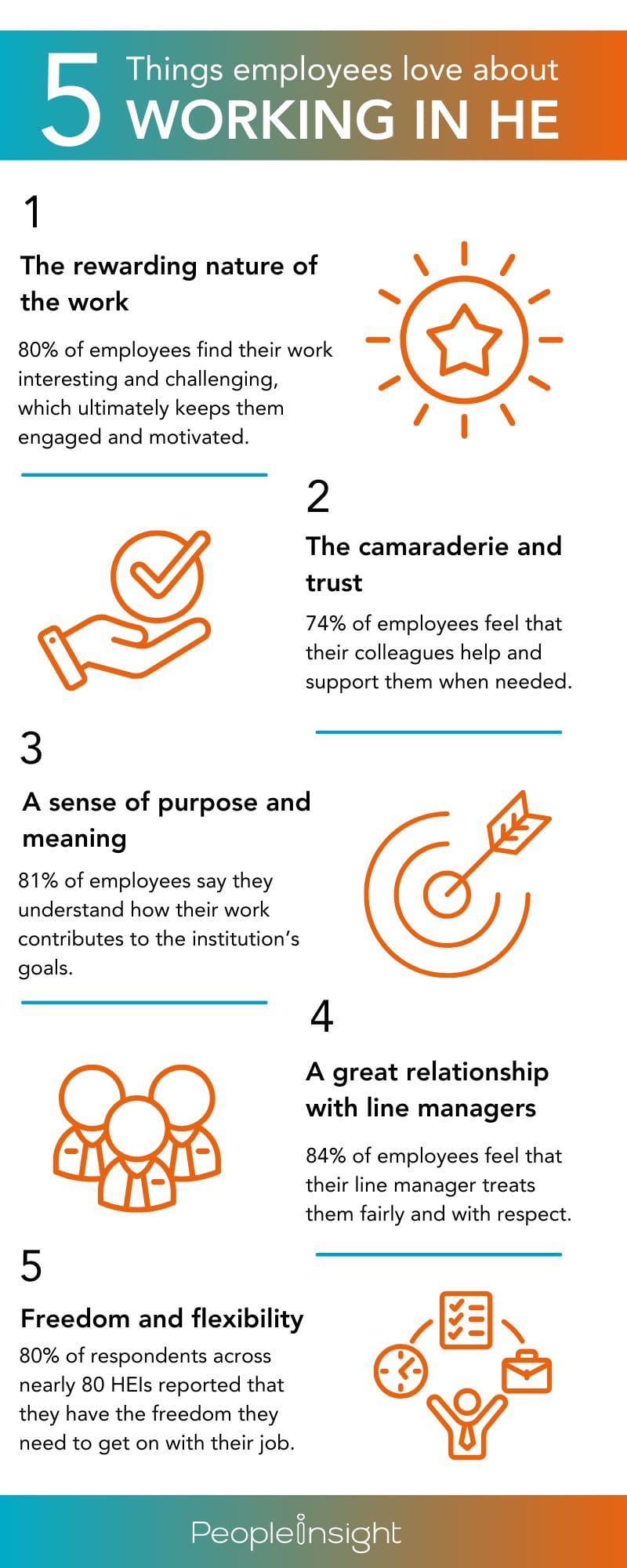
Working in higher education, for most, is more than just a job — it’s a passion for education, learning and self-improvement. In fact, it’s a sector that tends to inspire a lot of loyalty. Recent research conducted across nearly 80 higher education institutions (HEIs) in the UK reveals that employees are highly invested in their workplace. An incredible 89% of respondents reported that they care about the future of their institution, while 76% are proud to say they work for their HEI. Even better, 72% stated that working at their institution motivates them to do their best work. If these findings reflect anything, it’s the fact that HEIs across the country are doing a great job of creating environments that foster motivation and pride among both academics and professional services staff.
But we can drill down further into the data and reveal exactly what employees love about working in higher education — here is what we’ve found from surveying universities all across the UK.
Related: Change management in education: Why is it so hard?

Unsurprisingly, what most employees seem to love most about working in higher education is the nature of the work itself. A remarkable 80% of employees find their work interesting and challenging, which ultimately keeps them engaged and motivated. Higher education institutions provide an intellectually stimulating environment where employees can engage with complex ideas, conduct impactful research and think critically about subjects that matter a lot to them.
Academics, in particular, are enthusiastic about the work they do, as it often involves exploring specific topics within their area of expertise. The potential to make a tangible impact in their respective fields is understandably exciting, and they also get to teach and interact with students who are keen to learn the subject themselves. Many employees take pride in positively influencing students’ lives and careers, making the work not only intellectually rewarding but also emotionally fulfilling.
Professional services staff, though less involved in academic research, also find satisfaction in their roles. Their work supports the academic mission, whether through administrative excellence, student support or operational efficiency, all of which are crucial to the success of their HEI.
Read more: The benefits of supporting career development for professional services staff in higher education
Workplace relationships mean a lot to all of us. After all, we spend a lot of time at work, and building trusting, amicable bonds can make all the difference to our overall morale. Employees in higher education generally seem to value the strong sense of camaraderie among colleagues. Our research shows that 74% of employees feel that their colleagues help and support them when needed. Friendly, supportive and kind are common words used to describe their peers. The workplace atmosphere is often characterised by warmth and mutual respect, where people genuinely care about each other’s well-being. This sense of community within local teams contributes significantly to job satisfaction and creates a work environment where people feel valued and supported.
A sense of purpose is another major factor that draws people to work in higher education. 81% of employees say they understand how their work contributes to the institution’s goals. This clarity and connection between daily tasks and overarching institutional aims works to create a strong sense of meaning and purpose.
When employees see how their efforts feed into larger organisational objectives, it boosts their motivation and engagement. Knowing that their work makes a difference, whether in advancing knowledge, supporting students or enhancing institutional reputation, drives employees to excel. It also provides them with a sense of meaning, so they’re not simply clocking in and out at arbitrary times — they’re working towards something bigger than themselves.
Related: How HEIs are creating a sense of purpose at work [infographic]
Line managers play a huge role in shaping the employee experience within higher education. Our data reveals 84% of employees feel that their line manager treats them fairly and with respect.
Employees describe their line managers as approachable, respectful and considerate. Effective communication is a real strong suit for line managers in HE, with three-quarters of employees agreeing that their line manager communicates effectively. Unsurprisingly, line managers have a huge impact on employee engagement and can make all the difference when it comes to employee turnover within HE.
Another thing employees love about working in higher education is the freedom and flexibility involved in their roles. 80% of respondents across nearly 80 HEIs reported that they have the freedom they need to get on with their job. This autonomy is highly prized and allows employees to work independently, develop innovative ideas and feel trusted by their colleagues and managers.
The recent shift towards hybrid working models, flexible hours and remote work options has further strengthened the appeal of working in higher education, particularly for those in professional services. This flexibility allows employees to manage their work-life balance more effectively, contributing to their overall well-being and job satisfaction.
While there is much to celebrate and love about working in higher education, no workplace is perfect and it’s important for HEIs to remain attuned to their employees’ needs and concerns. Listening to employees and improving the employee experience is essential for any institution wishing to maintain high levels of motivation, engagement and morale.
A higher education staff survey is a great way for institutions to gauge how their employees feel about the nature of their work, their work environment and the demands placed upon them. The act of carrying out a survey (and acting on the results as needed) shows employees that their opinions matter and that their HEI is committed to making necessary changes. By working with organisations like People Insight, institutions can benchmark their data against nearly 80 UK universities (including Russell Group universities) to see where they stand. By arming yourself with data, you stand to improve an already incredible employee experience, keeping your high performing employees with you for years to come.
If you are keen to carry out an employee engagement survey within your institution, contact us today for a demo, and to discuss how we can help your HEI implement meaningful change.
